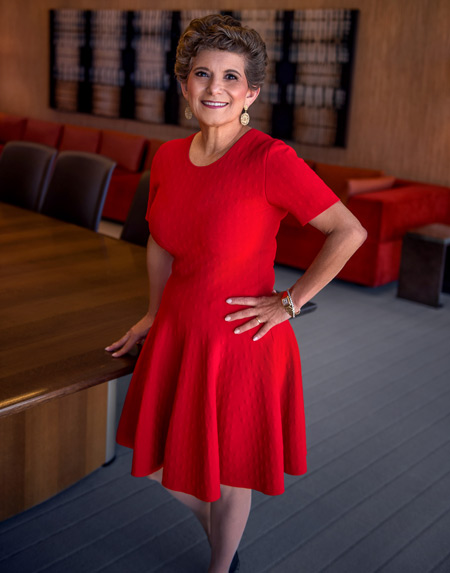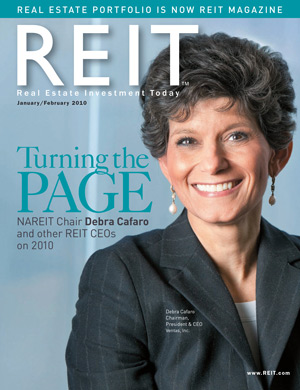Debra A. Cafaro’s leadership and flexibility have driven her career, and her company, to great heights.
The equity market cap at Ventas, Inc. (NYSE: VTR) was about $200 million in 1999 when Debra A. Cafaro first joined the health care REIT as CEO. Over the past 23 years, Cafaro has helped grow that to a peak of $28 billion. She calls it a “business fairytale.”
Long before she was a top REIT industry CEO though, Cafaro’s diverse career path took her from law, working as an attorney for 13 years, to making the major career change to business. Working today in the large, dynamic sectors of real estate and health care, Cafaro encourages young people to be open to career possibilities, just as she has always been.
Today, Cafaro has a passion for the health care sector, where she stresses that care is delivered and cures are discovered; and she believes health care is critical in every person’s life. As Ventas’s leader, she takes a broader perspective, too, noting that the demand for health care means it’s a reliable revenue stream.
As part owner of the Pittsburgh Penguins, with two Stanley Cup rings to show for it, Cafaro is rooted in the values of sports, family, and her hometown of Pittsburgh, Pennsylvania. As a leader, she is focused on reinvigorating and reinforcing Ventas’s team culture, while also making sure the REIT is focused on elevating and diversifying its board, workforce, and communities.
Emerging from the pandemic, Cafaro says she is optimistic about Ventas’s future, with demographic demand on the company’s side and strong opportunity for growth ahead.
Cafaro recently spoke with REIT magazine about how she helped turn Ventas around over 20 years ago, mentors who are also friends, and getting to witness the Pittsburgh Steelers’ famed Immaculate Reception with her father in 1972.
What led you to join Ventas?
In 1999, Ventas was in crisis and in the midst of a significant turnaround. I was asked by one of my mentors who was on the board at that time to join the company as its CEO to try to turn things around and save it. It was an exciting challenge for me to take on, and also offered me a lot of opportunity.
There were immense, fundamental challenges that were existential. That was exciting and interesting to me. It also was a great opportunity because if we were able to save the company and ultimately build something of value for all stakeholders, it would be a tremendous accomplishment. I saw the demographic opportunity too. The first 13 years of my career were as a lawyer, so I had been a business executive for less than two years at the time the Ventas CEO opportunity came to me. It was just the kind of opportunity that I thought I could take on. And yet I would say that it was challenging enough that most established executives would not have been interested in it.
But for me, the chance to learn how to be a CEO, the chance to build something of value, and frankly, the chance to learn about health care, which represents nearly 20% of gross domestic product (GDP) and is so important in everyone’s life—it was a great opportunity. I was also able to work with Doug Crocker, who had been the CEO of Equity Residential, and I trusted him. That enabled me to take the leap of faith and join Ventas in 1999.
Health care has come even more so to the forefront throughout the pandemic. How does Ventas’s business operate?
Ventas operates at the exciting intersection of health care and real estate, and those are each nearly 20% of GDP. Ventas itself owns about 1,200 assets in the U.S., Canada and the UK, and it’s a portfolio that’s unified by demographic demand. We have a number of different verticals that are driven by demand from a large and growing aging demographic. Everything from senior housing, where we cater to the 80-plus population, the single fastest growing segment of the U.S. population; to life science on the other end, which really is based upon finding cures and treatments for diseases and helping people live longer, healthier lives; and everything in between, such as medical office, where we cater more to the 65-plus demographic, and where 10,000 baby boomers are turning Medicare-eligible every day in the United States.
That unifies our business. It is mission-driven in the sense that our sites are where care is delivered, it’s where cures are discovered, and it’s where people go to get health care. Health care is so important in people’s lives. At the same time, because of the demand, it also produces reliable, growing cashflow, which is what it’s all about from a REIT perspective.
You’ve had a diverse career, transitioning from law to business and learning about both health care and real estate along the way. Who has guided or supported you as you’ve transitioned in these different ways?
I have been so fortunate over my entire life to have people give me a helping hand. It’s always been at a critical juncture where individuals have taken a chance on me. The lawyers who invested in me early in my career and supported me when I made a change of career were critical. At Ambassador Apartments, David Glickman gave me my first break to become the president of a multifamily REIT in 1997. Doug Crocker really encouraged me to take the job at Ventas; and Sheli Rosenberg and Sam Zell sprinkled fairy dust on me at these pivotal inflection points. I’ve also benefited a lot from what I would call peer mentors, people I grew up with in the business from my time as a lawyer, like David Neithercut. Having true friends who understand what you’re going through and can give you advice should never be underestimated. They’ve been really instrumental over the years as well.
My Ventas colleagues and directors are very supportive and have provided great insight and friendship over the years in a way that helps the company succeed and helps me succeed personally and professionally.
My whole educational and professional career has been about trying to reward all of these important people’s confidence in me by going above and beyond and succeeding even beyond their expectations. And also then to pay it forward to others.
I love how you say “peer mentors.” The work is critical, but the people you work with are what makes you able to thrive in a job.
It’s important to recognize those friendships that are peer relationships, where they can understand what you’re going through because they’re in the chair themselves. Those people understand you and don’t really have any agenda other than giving you good advice. The combination of those things is just so valuable. I think too few people actually use friends and peers like this to their fullest. Often in business, people might not want to show vulnerability.
What’s some of the best career advice you’ve ever received?
If someone is asking you to do something, then they believe that you can do it. Many times in my unorthodox career path, people have asked me to take on roles out of the blue for which I didn’t have particular subject matter expertise. And I would often be demure and say, “Oh, I don’t know anything about that. You want someone who knows something about health care,” or something similar. Finally someone said to me: “We’re asking you to do this because we think you’re the best person to do it.” I learned that if someone’s asking you to do something, they believe you can do it. It sounds simple, but it was a real insight for me. I think it especially applies to a lot of women executives, but to men as well.
Once, before I gave an important speech when I first started at Ventas and we were in the throes of an intense workout, the chairman said to me: “You got a great smile kid. Don’t forget to use it.” It was his way of saying: Be confident, be relaxed, be comfortable. You know what you’re doing.
What encouragement and advice do you offer young people at Ventas?
I think real estate is a great, great area to begin your career, and health care is a great sector too. Real estate is so interesting and tangible. Within real estate, there are so many different paths—from data centers, to cell towers, to health care, to logistics at retail—all of these different flavors of real estate have wonderful personalities and real legends in the industry. It is so much fun. What I encourage young people really in any sector to do is just to be open to the possibilities and try to be less set on a very specific career path. Be open, continue to learn, and push the boundaries so that they can actually see opportunities that might be different from what they expect them to be. Also, always make sure you are providing value, and be around people you respect and who want to invest in you. That’s really important too.
What hobbies do you pursue outside of work?
I’ve come to really enjoy the outdoors, hiking, and the national parks. And I love reading. Most of all, I love sports—the Pittsburgh Steelers and the Pittsburgh Penguins!
It’s interesting how sports can run so deep for so many different reasons. You grew up in Pittsburgh. What impact did Pittsburgh sports have on you growing up?
My parents were at the 1960 MLB World Series when second baseman Bill Mazeroski of the Pittsburgh Pirates hit a ninth-inning homerun to beat the New York Yankees in game seven. Then I saw the Immaculate Reception (a famous NFL football play during a game between the Pittsburgh Steelers and the Oakland Raiders) live with my dad in 1972. I grew up with Pittsburgh sports in my blood. I bleed black and gold.
I was also in Chicago during the Michael Jordan/Chicago Bulls NBA era, and I’ve had the privilege to attend the Olympics too. I just genuinely love sports. I always talk about it at Ventas. We always want to win, we want to win the right way, and we want to win as a team. That is the culture of Ventas.
You’ve been through a lot with Ventas since 1999. What are some of the company goals looking ahead?
Starting with the new millennium, Ventas has delivered 20% total returns to shareholders on a compound annual basis. I start there because we are focused on performance. The company’s goals for the next five to 10 years are really to deliver exceptional total return and growth. At the same time, we want to capture the demand from this growing demographic that extends across all our asset classes and continue to provide sites where healing occurs, where people can achieve wellness, and where cures and treatments are discovered.
You were on the cover of the redesigned REIT magazine January/February 2010 issue, and now here you are again in our last 1-on-1 for our November/December 2022 issue. When you look back on this time period, what strikes you the most?
What’s exciting has really been the growth and the diversification of the industry itself. In 2010, health care was really just breaking in to being recognized as a major food group within real estate, and now we have so many other areas, like data centers and cell towers, that are under the REIT umbrella. I think that is really wonderful.
When I sat for the REIT magazine interview in 2010, it was just as the country was emerging from the great financial crisis. A couple of things really struck me. One is that the REIT industry really did learn from that experience and ultimately went into the COVID crisis in substantially better financial condition. I believe as a result of the lessons learned in the great financial crisis, the discipline and sophistication of our industry have stood the test of time. The other thing that occurred to me is that we always talk about these crises coming maybe every hundred years, but frankly, they come every 10 years or so.
Obviously COVID presented a great challenge for so many of us, and our industry and certainly Ventas carried itself well by devoting so much of its resources to keeping people safe. I’ve never been prouder than when we were involved in vaccinating 75,000 seniors in 2021. The industry really has come a long way financially and operationally, and also through how much we’re able to contribute to our communities and those who live in our buildings. That really resonates with me as a great thing, and I hope the next 10 years for Ventas and for our industry are as good as the 10 that came after the great financial crisis.


